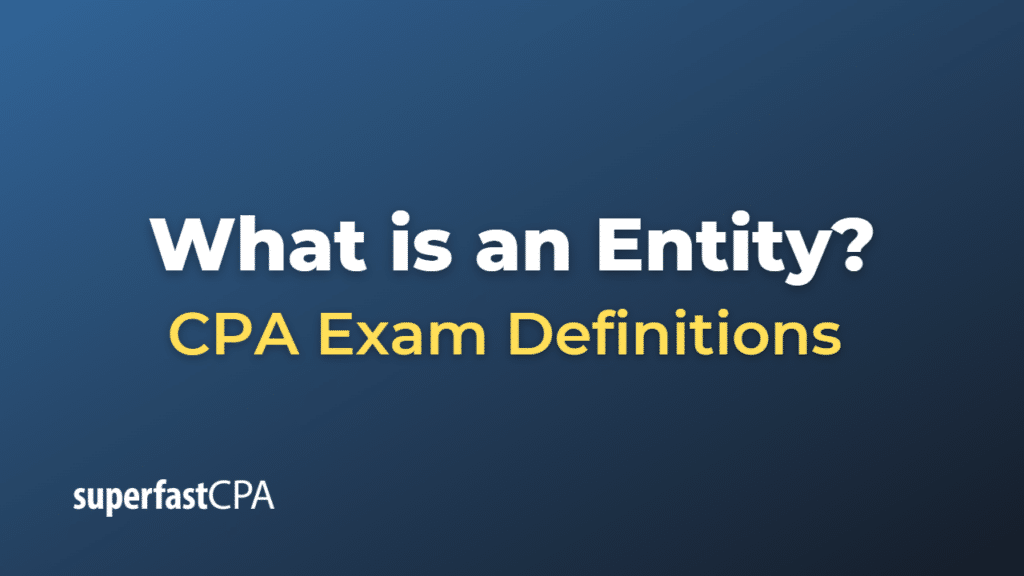Entity
In accounting and business, the term “entity” refers to an organization or unit that has a separate existence and can operate independently. The entity concept is fundamental in accounting because it draws a distinction between the financial transactions of the business or organization and the personal financial transactions of its owners or related stakeholders.
Here are key points to understand about the concept of an entity in accounting:
- Separate Entity Principle: This principle establishes that for accounting purposes, the business is treated as distinct and separate from its owners, managers, or other businesses. This means that the financial activities of the business entity are recorded separately from those of its owners or other related entities.
- Types of Entities: Entities can be of various forms, such as:
- Sole proprietorships
- Partnerships
- Corporations or companies
- Trusts
- Non-profit organizations
- Governmental units
- Legal Implications: Depending on the legal structure of the entity (e.g., sole proprietorship vs. corporation), there can be implications for liability, taxation, and other regulatory requirements. For instance, in most jurisdictions, corporations are considered separate legal entities, meaning they can own property, enter into contracts, sue and be sued independently of their owners.
- Financial Reporting: The concept of an entity is crucial in financial reporting. Each entity’s financial statements reflect the financial position and performance of that specific entity, not the personal dealings of its owners or managers.
- Tax Implications: The type of entity can have significant tax consequences. For example, corporations might be subject to corporate taxes, while partnerships might pass through their income to be taxed directly to their partners.
- Entity Assumption vs. Going Concern Assumption: While the entity assumption focuses on the business being separate from its owners, the going concern assumption assumes the business will continue its operations indefinitely. Both are foundational principles in accounting.
In summary, an “entity” in accounting denotes any business organization or unit that is treated as having an independent existence for accounting and often legal purposes. This distinction ensures clarity and accuracy in financial reporting and tracking.
Example of an Entity
Let’s look at an example to illustrate the concept of an entity in accounting:
Imagine Sarah, a software developer, decides to start her own software development business named “TechSoft Innovations.” She sets it up as a corporation.
- Separate Entity Principle in Action:
- Sarah contributes $50,000 from her personal savings to fund “TechSoft Innovations.” For accounting purposes, this is recorded as the corporation receiving capital (equity) from an owner. It does not mean that Sarah lent the company money or that the company owes her personally.
- Sarah also buys a new laptop for her personal use for $1,500. This personal transaction is NOT recorded in the financial records of “TechSoft Innovations” because the business is a separate entity.
- On the other hand, when “TechSoft Innovations” earns revenue from its clients or incurs expenses for its operations, these are recorded in the company’s books, not Sarah’s personal records.
- Legal Implications:
- As “TechSoft Innovations” is set up as a corporation, it can enter contracts in its own name. If there’s a legal issue related to a product the company developed, the corporation itself might be sued, not Sarah personally (this protects Sarah’s personal assets, thanks to the limited liability feature of corporations).
- Financial Reporting:
- At the end of the fiscal year, “TechSoft Innovations” prepares its financial statements – the income statement, balance sheet, and cash flow statement. These reports reflect only the company’s financial activities, not Sarah’s personal transactions.
- Tax Implications:
- TechSoft Innovations” will file its corporate tax return and pay any due taxes on the profits it earned. Sarah will separately file her personal tax return and include her salary, dividends, or any other income she received from the company (or from other sources).
Conclusion:
From the above example, it’s evident that even though Sarah is the owner of “TechSoft Innovations,” there’s a clear distinction between her personal financial activities and those of the corporation. The entity concept in accounting ensures that such distinctions are maintained, resulting in clarity and transparency in financial reporting.













